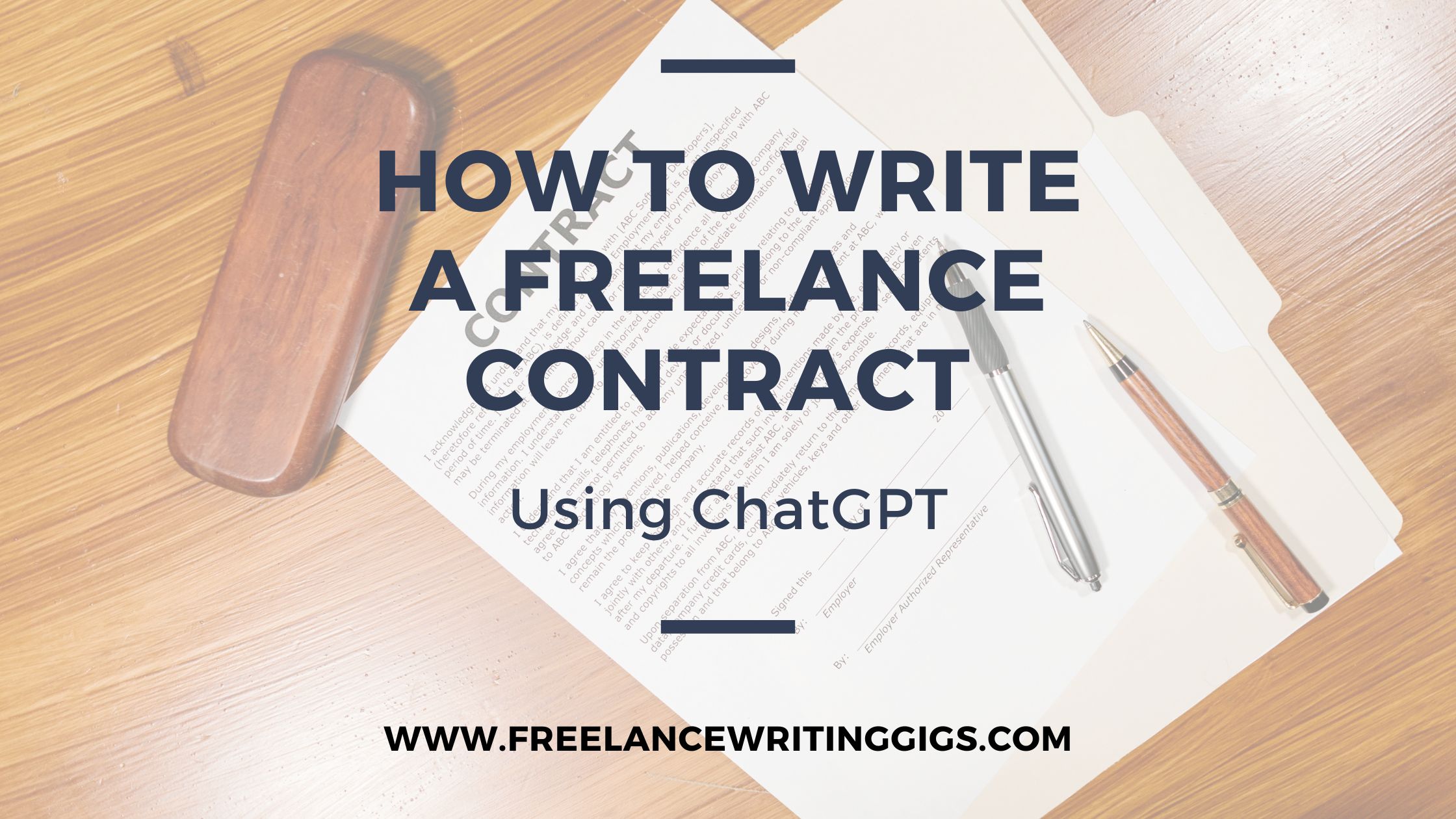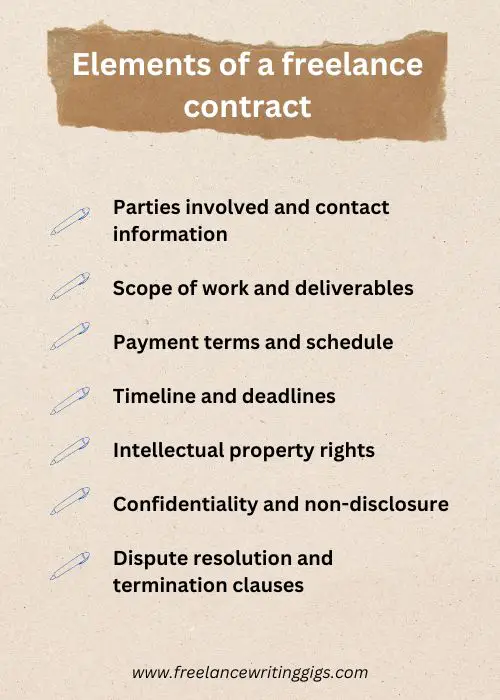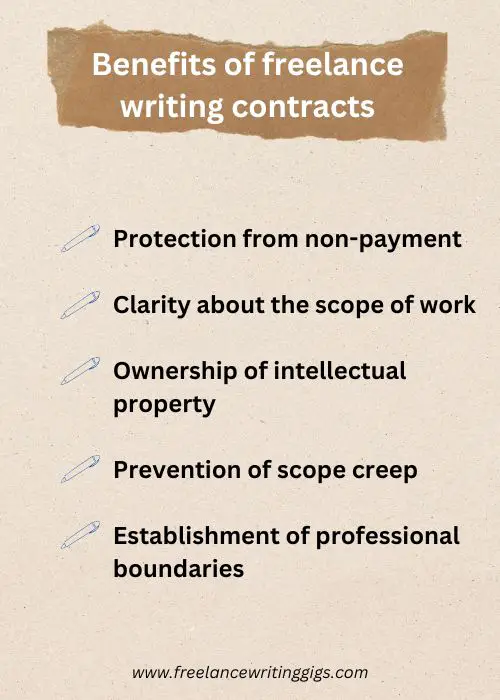In the world of freelancing, it’s crucial to establish clear expectations and protect both parties involved in a project. This is where freelance contracts come into play.
Freelance contracts (or freelance agreements) are important for both freelancers (independent contractors) and clients. For freelancers, they provide a level of protection in case there are any disputes with the client. For clients, they help to ensure that they are getting the services they have paid for.
But, believe it or not, only 28% of freelancers use contracts!
A freelance contract:
- Is a legally binding agreement between a freelance worker and a client that outlines the terms and conditions of their working relationship, and
- Serves as a roadmap for the project, ensuring that both parties are on the same page regarding deliverables, payment terms, timelines, and other important aspects.
So it doesn’t seem smart to be part of the 72% (a majority of freelance workers!) that don’t have a contract in place, does it?
Now, while creating a freelance contract may seem like a daunting task, technology has provided us with new tools to streamline the process. One such tool is ChatGPT, which we are all familiar with at this point. By taking advantage of ChatGPT, you can now simplify and expedite the process of creating freelance writing contracts.
You can use this AI tool to generate a written agreement that is tailored to your specific needs, as well as your client’s. Plus, it can help ensure that both parties are on the same page and that the contract is legally binding.
In this article, we learn the basics of freelance writer contracts and how to write a freelance contract using ChatGPT. We also share a free freelance contract template for you to download.
The Basics of Freelance Contracts
A freelance contract is a legal document that outlines the terms of an agreement between a freelancer and a client. It typically includes information about the scope and type of work, payment terms, and deadlines. It may also include a non-disclosure agreement. Freelance contracts can help to protect both the freelancer and the client in the event of a dispute.
Elements of a freelancer contract
Contracts are specific to the freelance writer and client/project. However, a freelance contract has a structure and certain elements that are usually present. These components help ensure that all important aspects of the working relationship are addressed and documented.
Here are seven essential elements to consider when drafting a contract for freelance work.
1. Parties involved and contact information
Clearly state the names and contact details of both the freelancer or freelance business (the service provider) and the client (the recipient of the services). This section establishes the identities of the involved parties and serves as a reference for communication purposes.
2. Scope of work and deliverables
Outline the specific services to be provided by the freelancer. Define the project scope, including the tasks, deliverables, and any limitations or exclusions. This section helps set expectations and avoids misunderstandings regarding the nature and extent of the work to be performed. It’s your superpower when it comes to avoiding scope creep!
3. Payment terms and schedule
Clearly define the compensation structure, including the payment amount, currency, and method of payment (e.g., hourly rate, fixed fee, or milestone payments). Specify any relevant payment milestones or deadlines for invoices, as well as any additional expenses or reimbursements that may be applicable.
4. Timeline and deadlines
Establish a timeline for the project, including key milestones and deadlines for deliverables. This section ensures that both the freelancer and the client have a shared understanding of the project timeline and can plan their respective activities accordingly.
5. Intellectual property rights
Address the ownership and usage rights of intellectual property related to the project. Specify whether the freelancer or the client will retain ownership of the work produced, and outline any usage rights or limitations. Who owns the work? You or your client?
6. Confidentiality and non-disclosure
Include provisions to protect sensitive or proprietary information. Define the obligations of both parties to maintain confidentiality and prevent the unauthorized disclosure of confidential information obtained during the course of the project.
7. Dispute resolution and termination clauses
Specify the procedures for resolving disputes or disagreements that may arise during the project. Additionally, include provisions for contract termination, outlining the conditions under which either party can terminate the agreement and the resulting consequences.
Again, note that these are the usual suspects. If your client has specific requirements, your freelance contract should include those.
Benefits of freelance writing contracts
Seriously? Am I still asking this question? Bear with me, please. I like documenting things, so just in case someone needs to know why they should use a freelance writing contract for their next client, they don’t come back to me and ask why. 🤷🏽♀️
1. Protection from non-payment: protect you from clients who may not pay you for your work. The contract should specify the payment terms and schedule, and it should also include a clause that allows you to terminate the contract if the client does not pay you.
2. Clarity about the scope of work: ensure that you and your client are on the same page about the scope of work. The contract should clearly define the deliverables that you are expected to produce, as well as the deadlines for completing the project.
3. Ownership of intellectual property: help you to protect the ownership of your intellectual property. The contract should specify who owns the copyright to the work that you produce, and it should also include a clause that prohibits the client from using your work without your permission.
4. Prevention of scope creep: avoid scope creep, which is when a client adds additional work to a project after the contract has been signed. The contract should specify that any changes to the scope of work must be agreed upon by both parties in writing—so no one goes and says, “You said you would do this!” (when you didn’t).
5. Establishment of professional boundaries: establish professional boundaries with your clients. The contract should specify the terms of communication between you and the client, as well as the process for resolving any disputes.
By using a freelance writing contract, you can protect yourself from potential problems and ensure that your work is fairly compensated.
How to Write a Freelance Contract With ChatGPT
You already know what ChatGPT is and what it can do. If not, check out our resource section, ChatGPT for Freelance Writers. For complete beginners, I suggest starting with “Improving Your Writing With ChatGPT: A Guide for Freelance Writers.”
But why use ChatGPT for your freelance writing contracts when you can download templates on the web? Well, you still have to edit those freelance contract templates, and the good ones may not be free to download. With ChatGPT:
- You can save time and effort. ChatGPT can generate a contract in a matter of minutes, even less.
- You can create a contract that is tailored to your specific needs. ChatGPT can be customized to include your specific terms and conditions.
- It can help ensure that the contract is legally binding. ChatGPT can generate a contract that is compliant with the law.
It’s all about efficiency and compliance.
Follow these steps to create a freelance contract using ChatGPT
Let’s get down to the brass tacks. How do you write a freelance writing contract using ChatGPT? Don’t you just key in, “Write a freelance writing contract?”
Not quite…🤔
Here is a step-by-step guide you can follow.
- Determine the required information: Before engaging with ChatGPT, gather all the necessary information for the contract. This includes the parties’ details, project scope, payment terms, timelines, and any specific clauses or requirements.
- Provide clear instructions to ChatGPT: This is where a lot of people fail when using AI writing tools. When interacting with ChatGPT, be explicit and specific in your instructions. Clearly state the sections or clauses you need assistance with and provide any specific details or requirements to ensure the generated content aligns with your needs.
- Generate the initial draft of the contract: Use the information and instructions you’ve gathered to generate the initial draft of the contract. ChatGPT will generate text based on its understanding of the instructions and the language patterns it has learned.
- Review and customize the generated content: Super important! Review the content generated by ChatGPT and assess its accuracy, coherence, and adherence to your requirements. Customize the generated text to align it with your specific project, client, and legal considerations. Edit and refine the content as necessary.
- Repeat if needed: If you find that certain sections require further refinement or if you need additional content, go back to Step 2 and repeat. Provide clearer instructions or ask specific questions to get the desired content for those sections.
- Finalize the contract: Once you are satisfied with the content and have customized it to your liking, finalize the contract. Review it one final time to ensure its accuracy, clarity, and completeness. Consider seeking legal advice to ensure compliance with relevant laws and regulations, especially for complex projects.
Limitations and considerations
Every article I write about ChatGPT (and AI writing assistants in general) comes with this section—because it’s necessary. As much as I find these tools super useful, I am well aware of the fact that they cannot stand on their own.
In this context, what should you look out for?
- ChatGPT may not always grasp the full context of a specific project or industry. It’s essential to provide clear and detailed instructions to ensure accurate and relevant content generation.
- Since it’s an AI language model, ChatGPT is NOT a substitute for professional legal advice. While it can assist in generating contract content, it’s advisable to consult with a lawyer or legal professional to ensure that the contract aligns with local laws and regulations.
- ChatGPT’s responses are based on patterns it has learned from training data, which may not always account for specific legal requirements or nuances. Therefore, it’s important to review and customize the generated content to address any compliance or specificity needs.
ChatGPT is a tool that can enhance and expedite the contract writing process, but it should be used in conjunction with human judgment and expertise. Carefully review and edit the generated content to ensure accuracy, clarity, and legal compliance.
Best Practices for Writing an Effective Freelance Contract
Whether you are using an AI writing assistant for creating your freelance writer contract or you’re going at it all by yourself, it’s good to follow some best practices.
Use clear and concise language
Communicate your terms as a contractor in a straightforward and easily understandable manner. Use plain language and avoid unnecessary jargon or complex legal terminology. This ensures that both parties can comprehend the terms and reduces the likelihood of misinterpretation or confusion.
Ensure clarity in terms and expectations
Define the scope of work, deliverables, and any specific requirements or milestones clearly. Outline responsibilities, obligations, and rights—both yours and your client’s.
Include specific details such as project timelines, payment terms, and any relevant project-specific conditions. Avoid ambiguous language or vague terms that may lead to differing interpretations.
More than this, make sure you don’t overpromise. Only state what you can deliver for sure. In fact, it’s better to under-promise and over-deliver. Remember, what you write in the contract with your client is legally binding.
Seek legal advice if needed
If you are uncertain about certain legal aspects or working on a complex project, consider consulting with a lawyer or legal professional. They can provide guidance on local laws,and industry-specific regulations, and ensure that the contract adequately protects your rights and interests.
Tailor the contract to the specific project and client
One of the worst things you can do is use generic or boilerplate contract templates. Tailor the contract to the specific project requirements and the needs of the client. Consider any unique circumstances, project-specific details, or client-specific requests. A good freelance contract reflects the specific parameters of the working relationship.
Sample Freelance Writing Contract/Free Freelance Contract Template
It’s time to put all the concepts above into action. Here’s how you can create a freelance contract using ChatGPT.
First, generate an outline for the freelance work contract.
You can use this prompt to start: “Create an outline for a freelance writing contract.”
Next, generate the contract section by section
Once you’ve settled on an outline, instead of simply telling ChatGPT to write the entire contract, it is best to go section by section. That way, you can be specific about the details. It’ll also be easier for you to edit the information when you break down the document into manageable chunks.
As promised, here is a freelance contract template made with ChatGPT.
Please note that this template is a general outline for a freelance writing contract and may need to be customized to fit your specific circumstances and requirements. It is always recommended to consult with a legal professional to ensure that the contract complies with local laws and regulations.
Do You Need a Freelance Contract?
These days, absolutely!
Now, I acknowledge that in the past, a handshake deal is as good as any contract. These days, however, it is best to keep your bases covered with new clients. While I like to see the best in people, there are so many scams out there, and you don’t want to be a victim simply because you’re without a freelance agreement.
So, before taking on a new freelance project, make sure you create a contract. And make it easier on yourself by using ChatGPT as your assistant.





Leave a Reply